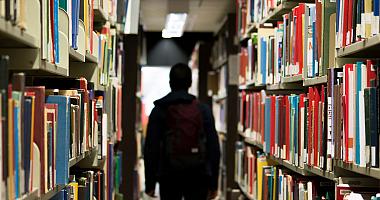MPhil/PhD English, Comparative Literature or Linguistics
Content navigation menu
Why study MPhil/PhD English, Comparative Literature or Linguistics at Goldsmiths
We offer MPhil and PhD research programmes in English (including American Studies), Comparative Literature or Linguistics for full-time or part-time study.
- Literary and Creative Studies at Goldsmiths consists of scholars and creative writers whose work is acknowledged and cited internationally.
- We offer a stimulating environment for undertaking postgraduate research in English Literature (including American Literature and literary theory), World Literature, Comparative Literature, Linguistics, and Creative Writing.
- We particularly encourage cross- and interdisciplinary research in emerging fields of study and creative practice.
- As well as working with scholars and writers of international standing, you will have the opportunity to play an active role in a vibrant research environment. This includes the Richard Hoggart Lectures in Literature and Culture, the annual Goldsmiths Prize for bold and innovative fiction, and specialist seminars and colloquia offered by the Goldsmiths Writers' Centre, the Centre for Caribbean and Diaspora Studies, the Decadence Research Centre, the Centre for Philosophy and Critical Thought, and the Centre for Comparative Literature, the Goldsmiths Literature Seminars (GLITS), the Goldsmiths Linguistics Seminars (GoldLingS), and the e-journal, GLITS-e.
North American applicants especially should note that the British system does not include preparatory taught classes or examinations as part of the MPhil/PhD programme, except for an initial course in research methods.
Assessment is by thesis and viva voce.
Find out more about our specialisms and expertise.
Contact
If you have specific questions about the degree, contact Carole-Anne Sweeney.
Length
3-4 years full-time or 4-6 years part-time
Entry requirements
A taught Masters in a relevant subject of at least high merit standard. We normally also expect an undergraduate degree of at least 2:1 standard. You might be considered if you aren’t a graduate or your degree is unrelated, but you have relevant experience and can work at postgraduate level.
Fees
Home - full-time: £TBC
Home - part-time: £TBC
International - full-time: £21000
School
Subject
What our students say

Entry requirements
You should normally have (or expect to be awarded) a taught Masters in a relevant subject area, of at least high merit standard. We normally also expect an undergraduate degree of at least upper second class standard.
You might also be considered for some programmes if you aren’t a graduate or your degree is in an unrelated field, but have relevant experience and can show that you have the ability to work at postgraduate level.
International qualifications
We accept a wide range of international qualifications. Find out more about the qualifications we accept from around the world.
If English isn’t your first language, you will need an IELTS score (or equivalent English language qualification) of 7.0 with a 7.0 in writing and no element lower than 6.5 to study this programme. If you need assistance with your English language, we offer a range of courses that can help prepare you for postgraduate-level study.
How to apply
Apply directly to Goldsmiths using our online application system.
If you are interested in applying, please send your academic CV, along with a preliminary research proposal, to graduateschool@gold.ac.uk. These will then be seen by the programme convenor, who will be able to advise on supervisor availability, and whether you should submit a formal application.
The actual topic of your research has to be agreed with your proposed supervisor, who will be a member of staff active in your general field of research, before you start at Goldsmiths. The choice of topic may be influenced by the current research in Literary and Creative Studies at Goldsmiths or the requirements of an external funding body.
For your application you'll need to have:
- Details of your education history, including the dates of all exams/assessments
- The email address of your referee who we can request a reference from, or alternatively an electronic copy of your academic reference
- Contact details of a second referee
- A personal statement – this can either be uploaded as a Word Document or PDF, or completed online. Please see our guidance on writing a postgraduate statement
- If available, an electronic copy of your educational transcript (this is particularly important if you have studied outside of the UK, but isn’t mandatory)
- Details of your research proposal
You'll be able to save your progress at any point and return to your application by logging in using your username/email and password.
If you wish to study on a part-time basis, you should also indicate how many hours a week you intend to devote to research, whether this will be at evenings or weekends, and for how many hours each day.
Research proposals
Along with your application and academic reference, you should also upload a research proposal at the point of application.
This should be in the form of a statement of the proposed area of research and should include:
- Delineation of the research topic
- Why it has been chosen
- An initial hypothesis (if applicable)
- A brief list of major secondary sources
When to apply
We accept applications from October for students wanting to start the following September.
We encourage you to complete your application as early as possible, even if you haven't finished your current programme of study. It's very common to be offered a place conditional on you achieving a particular qualification.
If you're applying for external funding from one of the Research Councils, make sure you submit your application by the deadline they've specified.
Selection process
If the subject you are applying to research is in an unrelated field, you may be considered subject to qualifying interview/submission of sample essays.
Fees and funding
Annual tuition fees
These are the PG fees for students starting their programme in the 2025/2026 academic year.
- Home - full-time: £TBC
- Home - part-time: £TBC
- International - full-time: £21000
If your fees are not listed here, please check our postgraduate fees guidance or contact the Fees Office, who can also advise you about how to pay your fees.
It’s not currently possible for international students to study part-time under a student visa. If you think you might be eligible to study part-time while being on another visa type, please contact our Admissions Team for more information.
If you are looking to pay your fees please see our guide to making a payment.
Funding opportunities
English and Creative Writing MPhil/PhD Fee Waiver
Applications are open to all students on English and Creative Writing MPhil/PhD programmes
Use the Goldsmiths scholarships finder below to find out what other funding you may be eligible for.
Paying your fees
Find out about paying your tuition fees.
If you are a UK student you may be eligible for a postgraduate loan.
Meanwhile our Careers Service can also offer advice on finding work during your studies.
Additional costs
In addition to your tuition fees, you'll be responsible for any additional costs associated with your course, such as buying stationery and paying for photocopying. You can find out more about what you need to budget for on our study costs page.
There may also be specific additional costs associated with your programme. This can include things like paying for field trips or specialist materials for your assignments.
Careers
Where this degree can take you
Our graduates have gone on to pursue careers in:
- Publishing
- Journalism
- Public relations
- Teaching
- Advertising
- The civil service
- Business/Industry
- The media
Carrying out a research degree will help you develop:
- Transferable skills, including enhanced communication and discussion skills in written and oral contexts
- The ability to analyse and evaluate different textual materials
- The ability to organise information, and to assimilate and evaluate competing arguments
Research training programme
Training in research methods and skills is provided both by staff in Literary and Creative Studies and Goldsmiths' Graduate School.
This begins with an intensive week-long induction in the first week of enrolment and continues later in the first term with a series of seminars focussing on the specific challenges of literary and linguistic research projects.
We will also inform you about any research training seminars or study-days offered elsewhere in the University of London (for exmaple, by the Institute of English Studies or the Institute of Modern Languages Research, School of Advanced Study) or beyond, such as at the British Library.
The specific training requirements of your project will be assessed, and guidance provided on specialist seminars and conferences to attend, which can be supported where possible by assistance from Literary and Creative Studies funds.


.jpg)


